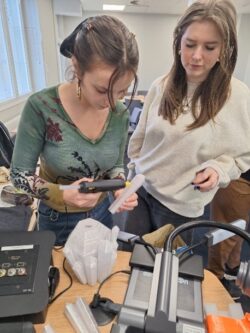Transdisciplinary Decolonial Conversations as Pedagogy
Over the past four weeks, CTIS has facilitated a series of workshops between students and visiting Professor Dr Paulo Cesar Teles (University of Campinas, Brazil). Drawing on interdisciplinary and transcultural pedagogical practices, these events offered a unique opportunity for students not just at POLIS, but also from the Schools of Fine Arts and History to experience collaborative knowledge creation through building a multi-sensorial art installation.
Organised by CTIS member Anna Grimaldi, this project adds to the growing ways CTIS is enhancing the student experience through collaborative, decolonial and arts-based pedagogies.

Titled “Evil is not the Metal” (Vil Nao é o Metal), this interactive installation – which also took place in Portugal last year – focused on the extractive industry around gold in Brazil. Following a series of themed around “Technoresistances, New Sensitisation and Critical Thoughts” in January this year, students contemplated and discussed their own situated experiences around gold, what it means to them, and how they might translate this into an interactive piece. Then, they were encouraged to propose specific sounds to express what gold meant to them (or what they remembered about it) – including rainforest birdsong, drilling and cash registers. The installation also incorporated touch pads and motion detectors to create unique musical compositions based on the listener’s movement and engagement with the piece.


The form of the piece represents the way cylindrical samples are extracted from rock to determine the presence of gold. On top of the rock formation, we placed a crystal which is often found near gold, which acts as an indicator of its presence. Once the installation was mounted, the pieces of ‘gold’ were incorporated, each triggering a specific sound when touched by the viewer.



While the installation itself generated fantastic interactions and awareness of gold mining in Brazil, the workshops themselves are what really provided students with a unique experience. Students were able to harness their diverse skills and knowledge and practice decolonial thinking by connecting with one another’s cultural and situational life experiences. They also developed an understanding of how cultural and artistic production, as a political act, can be used to represent, transmit and even catalyse political ideas and practices through interacting with various audiences.


